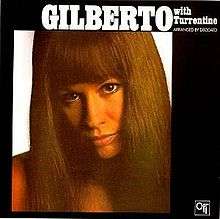Gilberto with Turrentine
Gilberto with Turrentine is an album by Brazilian samba and bossa nova singer Astrud Gilberto and American saxophonist Stanley Turrentine featuring performances recorded in 1971 released on the CTI label.[1]
| Gilberto with Turrentine | ||||
|---|---|---|---|---|
 | ||||
| Studio album by | ||||
| Released | 1971 | |||
| Recorded | January 13, February 1 & 4, March 19 and April 6, 1971 | |||
| Studio | Van Gelder Studio, Englewood Cliffs, NJ | |||
| Genre | Jazz | |||
| Length | 38:11 | |||
| Label | CTI CTI 6008 | |||
| Producer | Creed Taylor | |||
| Astrud Gilberto chronology | ||||
| ||||
| Stanley Turrentine chronology | ||||
| ||||
Reception
The AllMusic review calls the album a "set that had some mildly entertaining moments."[2]
| Review scores | |
|---|---|
| Source | Rating |
| AllMusic | |
Track listing
- "Wanting Things" (Burt Bacharach, Hal David) – 2:35
- "Brazilian Tapestry" (Eumir Deodato) – 5:10
- "To a Flame" (Stephen Stills) – 3:17
- "Solo el Fin (For All We Know)" (Fred Karlin, Arthur James, Robb Wilson) – 3:10
- "Zazueira" (Jorge Ben) – 3:40
- "Ponteio" (José Carlos Capinam, Edú Lobo) – 3:35
- "Traveling Light" (Deodato, Martha Everett) – 3:25
- "Vera Cruz" (Fernando Brant, Gene Lees, Milton Nascimento) – 5:05
- "Historia de Amor (Love Story)" (Alfonso Alpin, Carl Sigman, Francis Lai) – 3:29
- "Where There's a Heartache (There Must Be a Heart)" (Bacharach, David) – 3:10
- "Just Be You" (Astrud Gilberto) – 2:29 Bonus track on CD reissue
- "The Puppy Song" (Harry Nilsson) – 3:21 Bonus track on CD reissue
- "Polytechnical High" (Deodato, Everett) – 2:48 Bonus track on CD reissue
- Recorded at Van Gelder Studio in Englewood Cliffs, New Jersey on January 13 (tracks 9–11), February 1 (tracks 4 & 13), February 4 (tracks 1, 3, 7 & 12), March 19 (tracks 2 & 5), and April 6 (track 6 & 8), 1971
Personnel
- Astrud Gilberto – vocals
- Stanley Turrentine – tenor saxophone (tracks 2, 5, 6 & 8)
- Eumir Deodato – electric piano, arranger, conductor
- Emanuel Green, George Marge, Hubert Laws, Romeo Penque – flute (tracks 2, 5, 7, 8 & 10)
- Gene Bertoncini (tracks 1, 3, 4, 7, 10 & 12), Sivuca (tracks 2, 5, 6, 8) – guitar
- Sam Brown (tracks 1, 2, 5, 6, 8, 12 & 13), Bob Mann (tracks 3, 4, 7, 9 & 12) – electric guitar
- Toots Thielemans – harmonica (tracks 6 & 11)
- Ron Carter (tracks 1–3, 5–8 & 11), Russell George (tracks 4 & 9–13) – bass
- Dennis Seiwell (tracks 4, 9, 10 & 13), Dom Um Romão (tracks 2, 5 & 11), João Palma (tracks 1, 3, 7 & 12) – drums
- Airto Moreira – percussion (tracks 2, 5 & 11)
- Emanuel Green, Gene Orloff, Harry Katzman, Joe Malin, Julie Held, Paul Gershman – violin (tracks 1–5 & 7–10)
- Harold Coletta – viola (tracks 1, 2, 4, 7–10)
- George Ricci – cello (tracks 1–5 & 7–10)
gollark: Fine, maybe I'll add an "authentic mode" switch.
gollark: Aidan made a typo.
gollark: Oh, I figured it out, easy patch.
gollark: So you can go as far down as y=29.
gollark: I decided to look into patching the emu war bounds bug but it turns out I have no clue what causes it.
References
- Payne, Doug. "CTI Discography: 1970–72". Sound Insights. Retrieved 8 January 2018.
- Wynn, Ron. "AllMusic Review". AllMusic. Retrieved 8 January 2018.
This article is issued from Wikipedia. The text is licensed under Creative Commons - Attribution - Sharealike. Additional terms may apply for the media files.